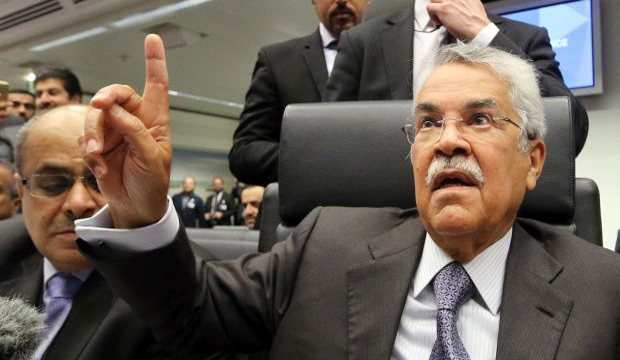
Saudi Arabia's minister of petroleum and mineral resources, Ali Al-Naimi, speaks to journalists prior to the start of a meeting of the Organization of the Petroleum Exporting Countries (OPEC) at their headquarters in Vienna, Austria, on Thursday, November 27, 2014. (AP Photo/Ronald Zak)
Abu Dhabi, Reuters—Saudi Arabia’s oil minister on Sunday defended OPEC’s decision to keep output steady despite the biggest market slump in years, saying current prices would help global economic growth and petroleum demand, while Arab states would escape major damage.
Ali Al-Naimi blamed a price slide to levels half of those six months earlier on speculators and what he called a lack of cooperation by major producers from outside of the Organization of the Petroleum Exporting Countries (OPEC).
His remarks to a conference in Abu Dhabi marked the second time in three days that he has signaled the world’s biggest crude exporter would not alter output levels but rather aims to allow the market to stabilize on its own.
“I am confident the oil market will improve,” he said.
At a meeting in November, OPEC kept its target output of 30 million barrels per day (bpd) unchanged, leaving the market to balance itself without the group’s intervention.
That stance was seen as a shift from a longstanding policy in which OPEC powerhouse Saudi Arabia acts as a swing supplier.
Naimi said the decision would ultimately help the world economy.
“Current prices do not encourage investment in any form of energy, but they stimulate global economic growth, leading ultimately to an increase in global demand and a slowdown in the growth of supplies,” he said.
Naimi also denied politics played a role in the Kingdom’s oil policy and said the price decline would not have “a noticeable and big” impact on the economies of Saudi Arabia or other Arab countries.
Speaking in Abu Dhabi, the capital of the United Arab Emirates (UAE), he said: “The talk about conspiracy by Saudi Arabia for political motives . . . is baseless and shows a lack of understanding.”
“The [oil] policy of the Kingdom is based on a strict economic basis, nothing more, nothing less,” he said.
The market slide has triggered conspiracy theories, ranging from the Saudis seeking to curb the US oil boom, to Riyadh looking to undermine Iran and Russia due to their support of Syrian President Bashar Al-Assad, an adversary of Riyadh.
Before the Vienna meeting last month, there were hints that Russia could cut output or exports if OPEC did the same.
But the message from Moscow after the meeting was that the world’s second largest oil exporter after Saudi Arabia would maintain its output levels.
Moscow’s relations with OPEC were soured by its pledge to cut output in tandem with the group in the early 2000s. Russia failed to follow through, and raised exports instead.
In Abu Dhabi, Naimi suggested OPEC could not act effectively to restore balance to the market without joint action with producers outside of the group.
“The Kingdom of Saudi Arabia and other countries sought to bring back balance to the market, but the lack of cooperation from other producers outside OPEC and the spread of misleading information and speculation led to the continuation of the drop in prices,” he said.
